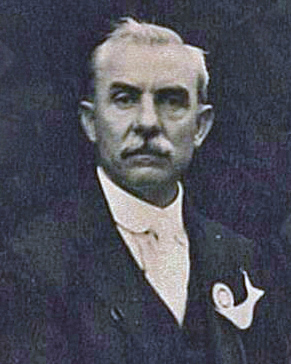Written by Stan Ingersol
From his column Past to Present
On February 25, 1917, District Superintendent Howard Eckel appeared at the Sunday morning service of University Church of the Nazarene in Pasadena, Calif., and read a prepared statement formally disorganizing the 400-member church. This extreme and arbitrary action generated a firestorm that threatened to split the young denomination. One reason it did not: within two weeks, Eckel had won the support of all but two or three of the district pastors, and the rest of the church took note.

Howard Eckel was born in Altoona, Pa., on Oct. 26, 1859. He was ordained in 1889 and pastored Methodist churches until 1902. Then he became pastor of First Congregational Church of McKeesport, Pa., and also fostered a Swedish home mission. He was active in the Western Pennsylvania Holiness Association and a popular preacher at holiness camps. A holiness press published his sermons in 1904.
H. F. Reynolds paved the way for Eckel to become pastor of the Association of Pentecostal Churches of America congregation in Haverhill, Mass., in 1906. This fellowship was dear to Reynolds’ heart.
After the merger of parent bodies in 1907-08, Eckel became pastor of the Nazarene congregation in Louisville, Ky., in 1909. He was the Kentucky-Tennessee district superintendent from 1910 to 1912 and proved to be an effective church planter.
He wrote approvingly of the ministry of women, noting in 1912 “a gracious revival… at our mission in the southern part (of Louisville) under the leadership of Miss Minnie Smith… a number have been converted and sanctified, and the crowds are increasing daily” (Herald of Holiness, July 10, 1912: 12).
Eckel was pastor of Grand Avenue church in Los Angeles in 1913-14, while his son, Will, led the Los Angeles Japanese Mission. He then took the church in Whittier, Calif., and was still relatively new to the Pacific coast when the Southern California District elected him superintendent in 1915. Eckel was the personal choice of W. C. Wilson, his immediate predecessor. Wilson had contended repeatedly with Seth Rees, an emotionally demonstrative preacher known as the “Earth-Quaker.” Rees became pastor of University Church in Pasadena in 1912.
Rees fostered harmful rumors, such as: “Dr. Bresee” was vain for receiving an honorary degree; other district ministers were “immoral.” He baldly stated that Los Angeles and Pasadena First Churches (and their pastors, C. E. Cornell and A. O. Hendricks) were “dead” (spiritually), while boasting that his congregation “has revival 52 weeks of the year.”
He attacked A. J. Ramsey, head of Pasadena College’s religion department, and did the same to Ramsey’s successor, A. M. Hills. He also tried to gain control of the college more than once, only to be rebuffed by those closest to Bresee.
Bresee and Wilson died in late 1915. From there, tensions between the “old guard” of Rees and Bresee simmered before coming to a head in 1917. Eckel’s breaking point came when he learned University Church was violating the denomination’s trust clause by deeding its property to a member. That’s when he decided to take action. He took a train to confer with General Superintendent E. F. Walker and then disorganized University Church on February 27.
Did he have authority to do this? The 1915 Manual said any district or general superintendent could disorganize a congregation, but did not state the conditions for taking such an action. (Conditions would, however, be added by the 1919 General Assembly.)
Rees predicted that the denomination would tear apart from end to end. It did not. Two weeks after the dramatic action, Eckel and Walker convened a meeting of district pastors and laity where they spent hours answering every question raised. In the end, they garnered the support of all district pastors except two or three.
Rees and his followers could have appealed the action. Instead, they broke away and started the Pentecost Pilgrim Church. About 500 Nazarenes left with Rees. By 1923, when he merged his Pilgrims with a much larger group, that figure had diminished.
At the next assembly, Eckel was reelected district superintendent on the first ballot and led the district until 1920.
He was pastor in Alhambra from 1920 to 1922. Bud Robinson conducted a revival there and later wrote: “There is no finer man on earth to work for than Brother Howard Eckel.” The comment is interesting in that Bud’s wife, “Miss Sally,” was one of Rees’ Pilgrims.
Having moved to Colorado and not liking the cold, in 1922, Eckel packed his family in a car and drove to Florida. He was pastor of Miami First Church for several years and superintendent of the Florida District (1927-29). He retired in 1939, but held revivals, and assisted struggling churches until his death on April 10, 1956, at the age of 96.
Stan Ingersol is manager of archives for the Church of the Nazarene.
